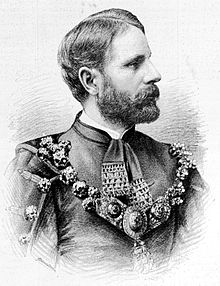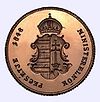- Károly Khuen-Héderváry
-
Károly Khuen-Héderváry 
Prime Minister of the Kingdom of Hungary In office
27 June – 3 November 1903
(0 years, 129 days)Preceded by Kálmán Széll Succeeded by István Tisza In office
17 January 1910 – 22 April 1912
(2 years, 96 days)Preceded by Sándor Wekerle Succeeded by László Lukács Ban of Croatia-Slavonia In office
4 December 1883 – 27 June 1903Preceded by Hermann Ramberg Succeeded by Teodor Pejačević Personal details Born 23 May 1849
Gräfenberg, Austrian SilesiaDied 16 February 1918 (aged 68)
Budapest, HungaryNationality Hungarian The native form of this personal name is Hédervári gróf dr. Khuen-Héderváry Károly. This article uses the Western name order.Dragutin Károly Khuen-Héderváry, also known as Károly Count Khuen-Héderváry de Hédervár (Croatian: Dragutin Khuen-Héderváry, 23 May 1849, Bad Gräfenberg (Czech: Jeseník), Austrian Silesia – 16 February 1918, Budapest), was a Hungarian politician, the ban of Croatia in the late nineteenth century. He succeeded the temporary reign of Ban Hermann Ramberg in 1883. Khuen's reign was marked by a strong magyarization. After a series of riots broke out against him in 1903, Khuen was relieved of his duty and appointed prime minister of Hungary.
Contents
Life
Károly Khuen-Héderváry was born as an oldest son of the 7 children between Hungarian magnate Antal Khuen (1817–1886) and his wife Angelika Izdenczi (1823–1894).
Ban of Croatia-Slavonia
During his time as ban, the Hungarian language came into official use and Hungarian symbols were brought alongside the national symbols of the Croats. Khuen was forced to deal with many protests, including one during the 1895 visit of King Franz Joseph. At the opening of the Croatian National Theatre which the King was attending, a group of students burned the Hungarian flag beneath the statue of Ban Jelačić.
Prime Minister (1903)
At the elections of 1901 the Liberal Party had obtained a considerable majority, and Prime Minister Kálmán Széll formed a government. He faced the greatest difficulty on 16 October 1902, when the Minister of Defence, Géza Fejérváry tabled a bill in the House of Representatives about the conscription of 20 thousands reervists. Against this proposal of the defence minister, the opposition, led by the Independence Party, launched an endless obstruction under the slogan of "no more soldiers without the introduction of Hungarian as the language service and command".
In the face of opposition, which paralysed the work of the parliament, the Széll government proved impotent and, so on 23 May 1903 King Francis Joseph authorised Károly Khuen-Héderváry, ban of Croatia, to initiate negotiations among the Hungarian politicians about the prospects of forming a new government. the ban, who had no immediate knowledge of the political conditions at Budapest, briefly acquainted himself with the situation and resigned his commission as he saw his situation utterly hopeless. Consequently, the ruler asked István Tisza on 16 June to agree as future prime minister with the politicians of the Liberal Party about the composition of the government. But the members of the governing party, fearing that Tisza would eventually break down the obstruction with violent means, refused to assume the ministerial posts offered to them one after the another.
After the failure of Tisza's effort to form a government, the king withdrew the commission of Széll and asked Khuen-Héderváry to initiate negotiations in a wider circle than before about the formation of his government at Budapest. As a result, Khuen-Héderváry made an agreement with the leaders of the Independence Party, promising them that in return for ending the obstruction he would drop the proposition of Fejérváry and would only table a bill for enlisting the regular yearly number of recruits. Yet the Khuen-Héderváry cabinet, which was appointed on 27 June 1903, realised already at the time of its introduction at parliament that a great part of the opposition representatives would continue their obstruction, which made parliamentary work impossible.
The situation of the prime minister further deteriorated after the session of parliament on 29 July, when representatives of the Independence Party announced that László Szapáry, Governor of Fiume, who belonged to the friends of Khuen-Héderváry, had tried to bribe oppositional representatives into suspending their obstruction. Although no direct evidence was found against the prime minister in the case of bribery, the ensuing scandal made even those oppositional representatives return to the camp of obstruction who had so far respected their agreement with Khuen-Héderváry. The latter, who saw no way out of the crisis, handed in his resignation, which was accepted by the ruler on 7 August. Three days later the parliament took cognizance of the government's leave.
Prime Minister (1910–1912)
He also served as Prime Minister of Hungary from 1910 to 1912, before World War I.
Political offices Preceded by
Hermann RambergBan of Croatia-Slavonia
1883–1903Succeeded by
Teodor PejačevićPreceded by
Kálmán SzéllPrime Minister of Hungary
1903Succeeded by
István TiszaMinister of the Interior
1903Preceded by
Gyula SzéchényiMinister besides the King
1903Preceded by
István TiszaMinister besides the King
1904–1905Succeeded by
Géza FejérváryPreceded by
Sándor WekerlePrime Minister of Hungary
1910–1912Succeeded by
László LukácsPreceded by
Gyula Andrássy the YoungerMinister of the Interior
1910–1912Preceded by
Aladár ZichyMinister besides the King
1910–1912Preceded by
Gejza JosipovićMinister of Croatian Affairs
Acting
1910Succeeded by
Gejza JosipovićPrime Ministers of Hungary since 1848 Revolution of 1848 Kingdom of Hungary Transition period M. Károlyi · Berinkey · Garbai · Peidl (opposed by G. Károlyi · Pattantyús-Ábrahám) · Friedrich · HuszárRegency Transition period Communist Hungary Republic of Hungary Italics indicates interim holderMinisters of the Interior of Hungary since 1848 Revolution of 1848 Kingdom of Hungary Transition period Regency Simonyi-Semadam · Dömötör · Ferdinandy · Tomcsányi · Ráday · Klebelsberg · Rakovszky · Scitovszky · Keresztes-Fischer · Kozma · Darányi · J. Széll · Keresztes-Fischer · Jaross · Bonczos · SchellTransition period Communist Hungary Republic of Hungary Ministers of Foreign Affairs of Hungary since 1848 Revolution of 1848 Esterházy · K. BatthyányKingdom of Hungary Festetics · Wenckheim · K. Tisza · Orczy · Szőgyény-Marich · Fejérváry · L. Tisza · Andrássy · Fejérváry · Jósika · D. Bánffy · M. Széchényi · Széll · G. Széchényi · Khuen-Héderváry · I. Tisza · Khuen-Héderváry · Fejérváry · Zichy · Khuen-Héderváry · Lukács · Burián · I. Tisza · Roszner · T. Batthyány · ZichyTransition period T. Batthyány · M. Károlyi · Berinkey · Harrer · Kun · Pogány · Kun · Ágoston · Tánczos · Lovászy · SomssichRegency Transition period Communist Hungary Republic of Hungary Ministers of Croatian Affairs of Hungary (1868-1919) Kingdom of Hungary Bans (viceroys) of Croatia Kingdom of Croatia Kingdom of Croatia-Slavonia L. Rauch (1867–1871) · Bedeković (1871–1872) · Vakanović (1872–1873) · Mažuranić (1873–1880) · L. Pejačević (1880–1883) · Ramberg (1883) · Khuen-Héderváry (1883–1903) · T. Pejačević (1903–1907) · Rakodczay (1907–1908) · P. Rauch (1908–1910) · Tomašić (1910–1912) · Cuvaj (1912–1913) · Skerlecz (1913–1917) · Mihalović (1917–1919)Actings bans indicated in italics.Categories:- 1849 births
- 1918 deaths
- 19th-century Hungarian people
- People from Jeseník
- Silesian-German people
- Prime Ministers of Hungary
- Hungarian politicians
- Croatian politicians
- Hungarian Interior Ministers
- Foreign ministers of Hungary
- Ministers of Croatian Affairs of Hungary
- Hédervári family
- Khuen family
- Khuen von Belasi
- Bohemian nobility
- Hungarian nobility
- Hungarian people of German descent
- Hungarian people of Czech descent
- Bans of Croatia
- Hungarian politician stubs
- Hungarian history stubs
- Nobility stubs
- Croatian politician stubs
Wikimedia Foundation. 2010.


